Fieldwork Classes
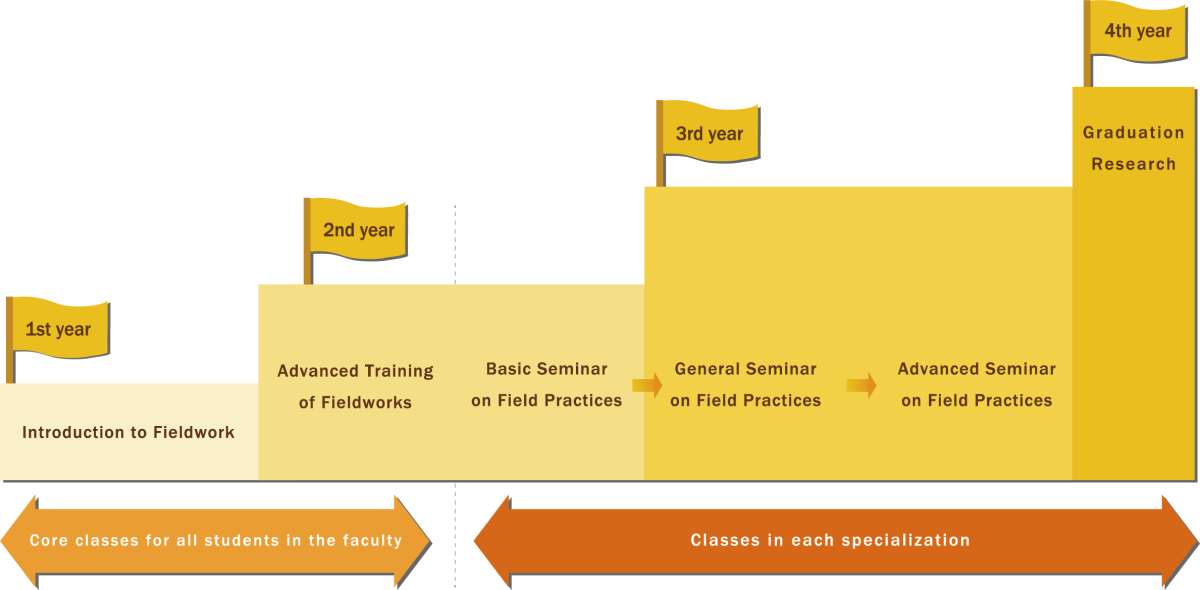
Fieldwork classes in which students collaborate with diverse stakeholders are an essential part of the Faculty of Collaborative Regional Innovation. In their first and second years, students enroll in Introduction to fieldwork and Fieldwork Practice, both of which are core classes that teach the basic perspectives and approaches to working in communities as well as basic research methods. From the second semester of their second year through their third year, students collaborate with stakeholders to learn practical problem-solving skills in the Introductory Project Seminar, Practical Project Seminar, and Applied Project Seminar classes, all of which are specialized classes linked to specific departments and programs in the faculty. In their final year, students work on a graduation research project under the guidance of a faculty advisor as the culmination of their four years of university study.
Introduction to fieldwork
In the Introduction to Fieldwork class, students will be prepared for actual fieldwork. The first half of the class is a classroom study of the basic methods required for fieldwork, including problem-finding skills, research techniques, and analytical methods. In the second half, students practice rudimentary fieldwork to put these methods into practice. Through this practice, students will learn the flow of the process from preliminary preparation, field survey, field report. Students learn the basics of fieldwork in this class, and learn full-scale practical training in the “Field Practice” in the second year.
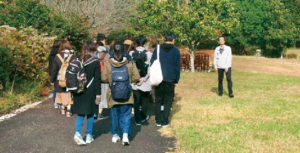
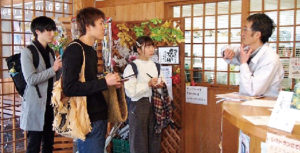
Fieldwork Practice
In the Fieldwork Practice class, students choose one of four fieldwork sites in Ehime Prefecture, then split into groups to hold discussions with diverse community stakeholders and conduct field research. During the field research, students first investigate community activities, resources, and problems and then present their findings to stakeholders. This process teaches them the role and significance of local stakeholders in sustainable community development and cultivates a collaborative attitude toward problem-solving.
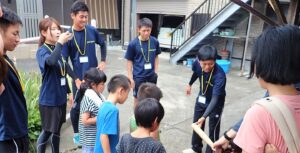
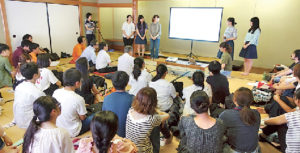
Introductory, Practical, and Applied Project Seminars
The three Project Seminar classes are taken successively from the second semester of the second year through the second semester of the third year. These are small classes taught by the faculty member(s) in charge of each project, focusing on a range of issues faced by communities and businesses. To enable problem-solving, students must first research and analyze the issue they are focusing on and consider the complex factors that make up its context from various perspectives. In the Practical Project Seminar, students build on the results of this research to propose ideas, consider strategies, and work with community stakeholders to arrive at the best solution. In the second semester of the third year, students from all departments and programs share their projects and results at a presentation session.
Industrial Management Department
Project Examples
- Surveying the strengths of small and mid-sized businesses in the city of Tōon
- Forecasting the impacts of AI on business organization
- Impact of work-style reforms on small and mid-sized businesses
- The relationship between employee happiness and business growth
- The mismatch between recruitment intentions and realities in small and mid-sized businesses
- Using information to boost productivity and publicity at regional businesses
Industrial Innovation Department
Project Examples
- Biological research using fish
- Life history study in the fishing industry
- Developing improved versions of existing paper products
- Proposing an industrial production method for paper made from the Japanese banana plant
- Researching the automation of agricultural machinery
- Enhancing development of automatic light equipment for fish pens
Environmental Design Department
Project Examples
- Researching the use of geographic information systems to identify sites at risk of slope failure
- Collaborative development of a theme song to support revitalization of the town of Nomura
- Realizing sustainable regional innovation by using geoparks
- Analyzing the relationship of vegetation and land use in the Tateiwa river basin with water quality and the river biome
- Hanazonomachi Street project in Matsuyama
- Practical study of disaster preparedness education involving the community
Regional Resource Management Department
Project Examples
- Exploring revitalization with residents of agricultural, mountain, and fishing village in Ehime Prefecture
- A study of local management organization in the town of Kumakogen
- Survey of folk implements and historical houses and their potential utilization for tourism in the Oda district of the town of Uchiko
- Studying the preservation and use of cultural heritage in the town of Kamijima
- Utilizing resources and promoting health by broadcasting sporting events in Ehime Prefecture
- Managing and teaching sports classes to improve the health of Matsuyama residents
